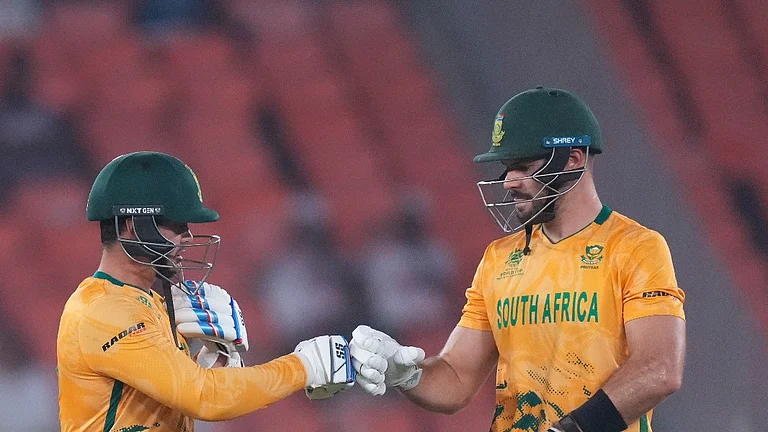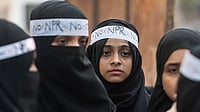The Maratha reservation agitation has picked up aggressive speed in Maharashtra with 6000 villages announcing a boycott of ministers of the Maharashtra Cabinet and party leaders cutting across the political divide. This call is in support of the ongoing hunger strike by Maratha leader Manoj Jarange-Patil in Jalna.
Villagers of the Maratha community are tearing down banners and hoardings of political parties and burning them. The boycott call is spreading to other villages in Maharashtra. In these 6000 villages, residents have started relay hunger strikes in support of Jarange-Patil, who had given the Maharashtra Government an ultimatum to grant reservations to the Maratha community in educational institutions and jobs by October 24.
Chief Minister Eknath Shinde and Deputy Chief Minister Devendra Fadnavis rushed to Delhi for a meeting with the senior BJP leadership for a solution to the Maratha reservation issue. With both the Lok Sabha and the Maharashtra Assembly polls slated for next year, the state government is racing against time to meet Jarange-Patil’s demands.
He had also demanded that the cases filed against the members of the Maratha community should be withdrawn within two days of his meeting with the chief minister on September 14. Though assurance for the same was given to him, Jarange-Patil now says that the Maharashtra Government is not serious about either withdrawing the cases or granting reservations to the Marathas.
In some of the villages where the boycott call has been given, the process for the gram panchayat elections has begun and nominations have been filed. All the candidates in these villages going to polls have withdrawn from the poll fray. Jarange-Patil had given a 40-day deadline to the Eknath Shinde-led Maharashtra Government to announce the reservation quota for the Maratha community. The deadline ended on October 24. Now, Jarange-Patil has started a fast-unto-death hunger strike at the Antarwali Sarathi village in the Jalna district of the state. He was on a hunger strike from August 29 until September 14, calling it off after the chief minister visited him in the village and assured him that the reservation would be granted.
The support pouring in from all quarters for Jarange-Patil has shaken the Maharashtra Government, say inside sources. In a public meeting early this month, held in an open field, an estimated eight lakh people attended the rally, putting him into the bracket of one of the top leaders of the Maratha community. According to sources, even Sharad Pawar – one of the strongest Maratha leaders – has not managed to pull in such a huge crowd at a public rally.
In an interaction with the media in Antarwali village, Jarange-Patil emphasised that he would not take food or water during the fast. He also announced that he will not take medical treatment or saline IV drip. Candlelight marches have been organised in all the villages across the state including the ones that have called a boycott of politicians. Meanwhile, senior BJP leader and minister Girish Mahajan, who is officiating as the emissary of the Maharashtra Government, has requested time to come up with a reservation quota that would stand the scrutiny of the court. Jarange-Patil’s demand includes that Kunbi (a community in the Other Backward Class category) certificates should be given to all Marathas within a fortnight.
The chief minister had announced in early September that a committee appointed by the Maharashtra Government would submit its report within a month on granting Kunbi caste certificates to the Marathas from the Marathwada region, which is considered as an economically backward region in the state. The OBC community is staunchly opposed to granting the Marathas reservation as Kunbis.
Sachin Rajurkar, leader of the OBC Mahasangh says that including Marathas in the Kunbi category is a “backdoor entry for the Marathas in the OBC quota”. The OBC leaders have demanded that the Maratha reservation must be accommodated under the Economically Weaker Sections category. “The Maratha community is not proven to be a socially backward community. Therefore, it cannot be included in the Kunbi category,” says Rajurkar.
The Kunbis, a farming community, are counted under the OBC category in Maharashtra. The Marathas of the Marathwada region were counted as Kunbis when the region was part of the Hyderabad Province. However, when the region became a part of Maharashtra, the Marathas were not counted as OBCs but as Marathas. Since then, it has been a long-standing demand of the Maratha community to be granted the status of Kunbis. However, a sizeable number of Marathas are also opposed to losing their upper caste status if categorised under Kunbis.
Deputy Chief Minister Ajit Pawar says that the reservation for the Maratha community will not be given through the OBC category. The Maharashtra Government has set up a committee under Justice Sandeep Shinde to look into the issue of Maratha reservation. Presently, there is 52 per cent reservation for the Scheduled Castes and Scheduled Tribes and 10 per cent for the Economically Backward Classes.
According to Pawar, the Maratha community already has reservations under the Economically Weaker Section category. He sought data to understand the benefits to the community in government jobs and admissions in colleges through this quota. There are over 350 castes that fall under the OBC category who have been demanding enhanced reservation as they claim that the present reservation quota granted to them is insufficient. The original Kunbis are also granted reservations under the OBC category, says Pawar.
The leader says that the NCP (Ajit Pawar faction) has demanded a caste census in Maharashtra on the lines of that conducted in Bihar to establish the accurate numbers of SCs, STs, OBCs, nomadic tribes, minorities, and other communities in the state.






















